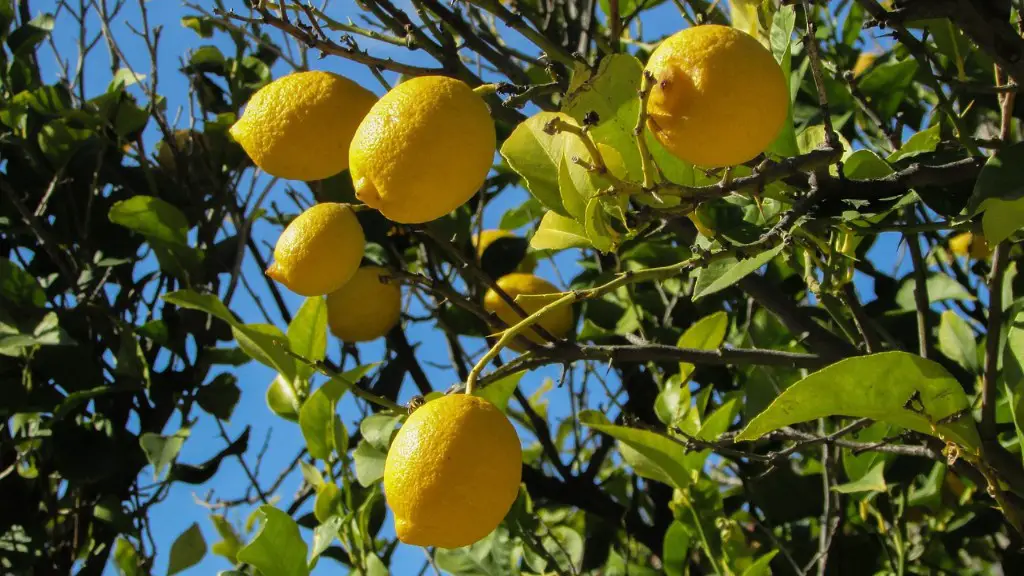With the popularity of cats as a house pet, pet owners have wondered if a lemon tree is poisonous to cats. The answer is both yes and no. While lemon tree sap and fruit can be dangerous to cats, the leaves, stems and branches are not considered hazardous.
Lemon tree sap and fruits contain essential oils that can be poisonous to cats when ingested. The essential oils can irritate skin, esophagus, mouth, and digestive systems if cats take a surprising bite. Some cats may suffer nausea or vomiting, so if ingested, consult with a veterinarian immediately.
The branches, stems and leaves of a lemon tree aren’t poisonous to cats, but that does not mean it is safe for cats to gnaw on them. The branches can break, causing injury, and cats may swallow the sharp thorns which can be problematic.
If you place a lemon tree in your home, you should keep a close eye on your cats to avoid any accidents. Place it in a secure place and keep cats away from it. If you can, enclose it in a barrier of a fence or a gate, as cats can easily climb into a garden or even a balcony to get closer to their curious target.
Outdoor cats may enjoy marking the trunk of the tree as part of their territorial behavior. This can cause a lot of damage to the tree and should be dissuaded either through giving the cats an alternative object to mark, or by keeping the tree out of reach.
In short, cats should not be allowed to eat or play with the sap, fruit, or foliage of a lemon tree; however, the branches and leaves are generally not considered dangerous. If you plan on growing a lemon tree at home, always keep an eye on your pets to ensure their safety.
Symptoms of Lemon Tree Poisoning in Cats
If a cat has ingested the sap, fruit, or leaves of a lemon tree, they may display symptoms such as vomiting, diarrhea, or lethargy. Your vet should be able to identify the plant ingested and treat accordingly. The most important thing to do is to keep your cat away from the lemon tree and take them to the vet right away.
Depending on the amount of essential oils ingested, the symptoms can range from mild to severe. The essential oils will likely cause a burning sensation in the mouth and throat. The cat may salivate more than usual and the tongue may swell up. In some cases, the cat may experience difficulty breathing, drooling, and gagging.
In severe cases, the cat may become hypothermic, which is a condition where the body’s temperature drops below normal levels. This happens when the poisoning impairs the cat’s ability to regulate its own temperature. Other symptoms of a severe reaction may include seizures, depression, and an inability to stand up.
Lemon tree poisoning in cats is not always serious or life-threatening, but it’s best to take precautionary measures. Keep your cats away from lemon trees and watch out for any signs of poisoning.
Treating Lemon Tree Poisoning in Cats
If a cat has ingested parts of a lemon tree, the best thing to do is to take it to a veterinarian right away. The vet will be able to identify the plant ingested and treat accordingly. Depending on the amount ingested, the vet will administer treatments such as activated charcoal, laxatives, and vomiting suppressants.
If the cat is severely affected, the vet may administer intravenous fluids to flush the toxins out of the body quicker and the cat may need to be hospitalised for more intense treatment. It is best to consult a vet for any treatments, as some items may be bought over the counter and could be harmful to cats.
The most important aspect of treating lemon tree poisoning in cats is prevention. Keep cats away from lemon trees, as even small amounts of sap or leaves can cause reactions. Be sure to clean up any sap or wet leaves left on the ground or the plant itself, as they can become toxic when in contact with saliva or urine.
The vet may also recommend specific changes to the cat’s diet and environment to protect against future poisoning. Overall, the best way to protect cats from the potential toxicity of a lemon tree is to be aware of the dangers and to keep cats away from it.
Prevention of Lemon Tree Poisoning in Cats
The best way to prevent lemon tree poisoning in cats is to be aware of the potential dangers and take precautions to ensure that cats are kept away from the sap, fruit, and leaves of the lemon tree. Keep cats away from the lemon tree, as even the smallest amount of sap or leaves can be toxic.
If it’s not possible to keep the cat away from the tree, it is suggested that the cat be supervised when near the tree. Place the lemon tree in an enclosed area and trim the branches so it is not easily accessed by cats. Enclosing it in a barrier of a fence or a gate can help to keep cats away.
To further protect cats, always make sure there is no sap dripping or leaves that have been dislodged from the tree. If cats ingest small amounts of sap or leaves, they could become sick. Clean up any sap on the ground or on the plant itself, as it can become toxic when in contact with saliva or urine.
To protect your cat from lemon tree poisoning, avoid growing lemon trees in your home or garden, and keep cats away from them when encountered outside. Also, clean up any sap or wet leaves that have been left on the ground and keep an eye on cats when in the presence of a lemon tree.
Summary of Lemon Tree Poisoning in Cats
Lemon tree poisoning in cats may occur when cats ingest the sap, fruit, or leaves of a lemon tree. This can cause mild to severe symptoms, such as vomiting, difficulty breathing, or seizures. The best way to protect cats from poisoning is to prevent it by keeping them away from the lemon tree and cleaning up any sap or wet leaves that have been left on the ground.
If a cat has ingested sap, fruit, or leaves of a lemon tree, it is best to take them to the vet for treatment and diagnosis. Treatment may include activated charcoal to flush out the toxins, and intravenous fluids may be administer if the cat is severely affected.
When owning a cat and a lemon tree at home, ensure that the cat is kept away from the tree, especially when outside. Place it in an enclosed area and trim the branches so it is not easily accessible. Always clean up any sap or wet leaves left on the ground or the plant itself and keep an eye on the cats when in their presence.





